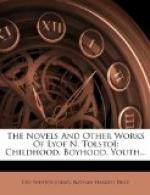But suddenly he turned in my direction with a malicious smile, and said as he rubbed his hands anew, “I hope you have learnt your lesson?”
“Yes,” I replied.
“Would you be so kind, then, as to tell me something about St. Louis’ Crusade?” he went on, balancing himself on his chair and looking gravely at his feet. “Firstly, tell me something about the reasons which induced the French king to assume the cross” (here he raised his eyebrows and pointed to the inkstand); “then explain to me the general characteristics of the Crusade” (here he made a sweeping gesture with his hand, as though to seize hold of something with it); “and lastly, expound to me the influence of this Crusade upon the European states in general” (drawing the copy books to the left side of the table) “and upon the French state in particular” (drawing one of them to the right, and inclining his head in the same direction).
I swallowed a few times, coughed, bent forward, and was silent. Then, taking a pen from the table, I began to pick it to pieces, yet still said nothing.
“Allow me the pen—I shall want it,” said the master. “Well?”
“Louis the-er-Saint was-was-a very good and wise king.”
“What?”
“King, He took it into his head to go to Jerusalem, and handed over the reins of government to his mother.”
“What was her name?
“B-b-b-lanka.”
“What? Belanka?”
I laughed in a rather forced manner.
“Well, is that all you know?” he asked again, smiling.
I had nothing to lose now, so I began chattering the first thing that came into my head. The master remained silent as he gathered together the remains of the pen which I had left strewn about the table, looked gravely past my ear at the wall, and repeated from time to time, “Very well, very well.” Though I was conscious that I knew nothing whatever and was expressing myself all wrong, I felt much hurt at the fact that he never either corrected or interrupted me.
“What made him think of going to Jerusalem?” he asked at last, repeating some words of my own.
“Because—because—that is to say—”
My confusion was complete, and I relapsed into silence, I felt that, even if this disgusting history master were to go on putting questions to me, and gazing inquiringly into my face, for a year, I should never be able to enunciate another syllable. After staring at me for some three minutes, he suddenly assumed a mournful cast of countenance, and said in an agitated voice to Woloda (who was just re-entering the room):
“Allow me the register. I will write my remarks.”
He opened the book thoughtfully, and in his fine caligraphy marked five for Woloda for diligence, and the same for good behaviour. Then, resting his pen on the line where my report was to go, he looked at me and reflected. Suddenly his hand made a decisive movement and, behold, against my name stood a clearly-marked one, with a full stop after it! Another movement and in the behaviour column there stood another one and another full stop! Quietly closing the book, the master then rose, and moved towards the door as though unconscious of my look of entreaty, despair, and reproach.




